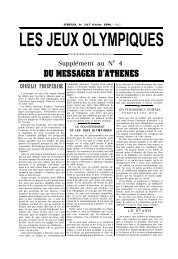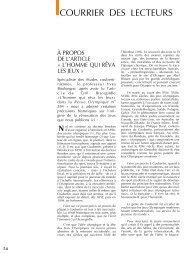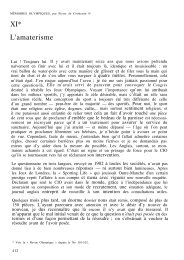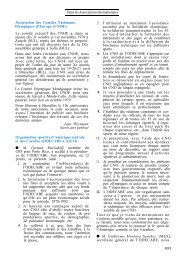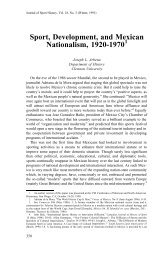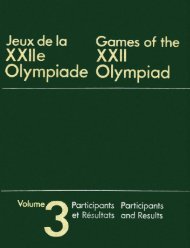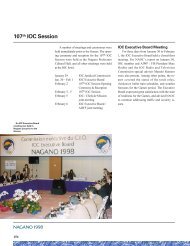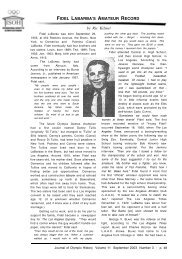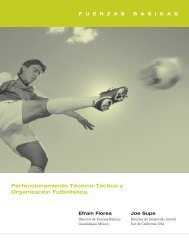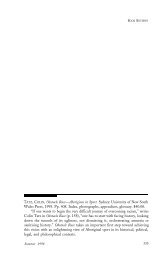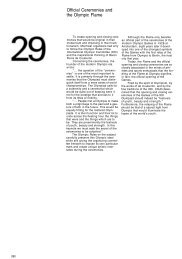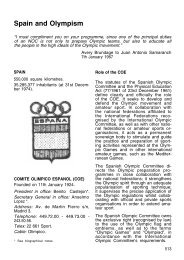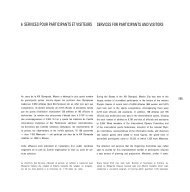Part 2 - LA84 Foundation
Part 2 - LA84 Foundation
Part 2 - LA84 Foundation
Create successful ePaper yourself
Turn your PDF publications into a flip-book with our unique Google optimized e-Paper software.
18. Accommodation<br />
18.1<br />
Basic Measures<br />
In accordance with IOC rules, the host<br />
city of the Olympic Games is required<br />
to provide comfortable accommodation<br />
to official participants at an acceptable<br />
price.<br />
Soon after Seoul was given the right to<br />
host the Olympics, the SLOOC set out<br />
to project accommodation demand<br />
and held sessions with the Seoul city<br />
government, Transportation Ministry<br />
and other related government agencies<br />
to discuss accommodation measures.<br />
The first order of business was to<br />
project how many people would come<br />
to Seoul for the Olympics and what<br />
standards of accommodation should<br />
be provided to the participants.<br />
The range of the accommodation<br />
measures the SLOOC had to be concerned<br />
with included: 1) The establishment<br />
of IOC secretariat office and<br />
headquarters hotel, and accommodation<br />
for IOC members, 2) accommodation<br />
conditions in the Olympic Village<br />
for athletes and officials, and the<br />
accommodation conditions at the<br />
Press Village for media personnel, 3)<br />
acquisition of accommodation facilities<br />
for Olympic Family, and 4) the accommodation<br />
needs for tourists attending<br />
the Games. After a series of surveys<br />
and investigations made with the<br />
Transportation Ministry between 1983<br />
and 1984, the SLOOC concluded that<br />
the existing tourist hotels, inns and<br />
dormitories were not sufficient to<br />
accommodate the projected 270,000<br />
members of Olympic Family and<br />
tourists who would visit Seoul for the<br />
Games. With the approval of the<br />
government in 1984, the SLOOC finalized<br />
a plan to construct Olympic and<br />
Press Villages and the Olympic Family<br />
Town.<br />
With consideration for the accommodation<br />
demand situation following the<br />
Games, the SLOOC decided to secure<br />
rooms in tourist hotels and to meet the<br />
additional demand by improving or<br />
utilizing high - class inns. The SLOOC<br />
also worked out a plan for a<br />
"home – stay" program using private<br />
homes to promote international<br />
friendship.<br />
The SLOOC decided to implement a<br />
strict room reservation system for the<br />
tourist hotels involved in the Games<br />
accommodation in order to prevent<br />
speculative demand during the peak<br />
periods and also to protect the domestic<br />
tourist industry. A payment system<br />
for reservation deposits was thus<br />
established.<br />
The accommodation measures were<br />
carried out with the cooperation of the<br />
Transportation Ministry. The ministry<br />
established an Accommodation Committee<br />
in December 1983 and<br />
organized an Accommodation Board<br />
and Accommodation Management Unit<br />
to assist the SLOOC in its efforts to<br />
secure accommodation facilities.<br />
In September 1985, the government<br />
replaced the guidelines for the designation<br />
and operation of hotels for<br />
Olympic Games tourists with a joint<br />
public notice by the Transportation and<br />
Health and Social Affairs Ministries.<br />
Dated May 12, 1986, the government<br />
promulgated a law covering support<br />
for tourism and accommodation businesses.<br />
In July 1986, an enforcement<br />
decree (Presidential Decree No.<br />
11950) was promulgated, and in<br />
August the same year, an enforcement<br />
regulation (Transportation Ministry<br />
Decree No. 841) was promulgated.<br />
Under its Article 3, the law set out tax<br />
incentives in favor of official hotels.<br />
In April 1985, the SLOOC created the<br />
Accommodation Division in its Protocol<br />
Department. However, the Accommodation<br />
Division was brought under the<br />
wing of the International Cooperation<br />
Department in December 1985 when<br />
the Protocol Department was incorporated<br />
into the International Cooperation<br />
Department.<br />
With the Games operation system<br />
being set in motion in July 1988, the<br />
organization was reshaped, into the<br />
International Cooperation Headquarters,<br />
and all accommodation affairs for<br />
official participants except for athletes,<br />
officials and media personnel were<br />
handled by the Director of Accommodation<br />
Operation under the wing of the<br />
Headquarters Hotel Operation Unit.<br />
Under the control of the Director of<br />
Accommodation Operation were<br />
Accommodation Support Manager and<br />
the First, Second and Third Accommodation<br />
Operation Managers. Under the<br />
control of the managers, 11 officers<br />
handled working affairs; the officers<br />
included the Information Desk Officer,<br />
Amenities Officer, Reservation<br />
Deposits Officer, IOC Officer, Airport<br />
Accommodation Officer, IBC Accommodation<br />
Officer, MPC Accommodation<br />
Officer, NOCs Officer, VIP Officer, IFs<br />
Officer, and NSF Officer. A command<br />
post for accommodation was operated<br />
in the Headquarters Hotel.<br />
The total number of accommodation<br />
operation personnel of the Headquarters<br />
Hotel Operation Unit came to 277,<br />
including 10 SLOOC staff members, 12<br />
support personnel, 11 temporary<br />
employees and 244 volunteers.<br />
Separate from the Headquarters Hotel<br />
Operation Unit, the International<br />
Cooperation Headquarters supervised<br />
the Olympic Family Town Operation<br />
Unit. Under the control of the director<br />
general of Family Town Operation Unit,<br />
the Family Accommodation Manager<br />
was in charge of accommodation<br />
affairs.<br />
18.2<br />
Supporting Organizations<br />
18.2.1<br />
Tourism and Accommodation<br />
Committee<br />
————————————–—<br />
The Accommodation Committee,<br />
chaired by the director general of Planning<br />
and Management Office of the<br />
Transportation Ministry, was organized<br />
comprising 16 persons from 14 organizations.<br />
The committee held its first<br />
session on January 21, 1985. The committee<br />
members included: deliberation<br />
officer at the Office of Administration<br />
Coordination for the Prime Minister;<br />
officer of the Olympic Support Planning<br />
Team of the Agency for National Security<br />
Planning; director general of the<br />
Tourism Bureau of the Transportation<br />
Ministry; director general of the<br />
Economic Cooperation Bureau of the<br />
Finance Ministry; director general of<br />
the International Sports Bureau of the<br />
Ministry of Sports; director general of<br />
the Public Health Bureau, the Ministry<br />
of Health and Social Affairs; Olympic<br />
Planning Officer, Seoul city government;<br />
directors of Planning Offices,<br />
Inchon city and Kyonggi-do (provincial<br />
governments); directors of Protocol<br />
and Spectator Service Departments,<br />
the SLOOC; director general of Tourism<br />
Promotion, Korea National Tourism<br />
Corp.; vice president of the Korea<br />
Tourist Association; president of the<br />
Central Federation of Hotels and Inns,<br />
and; the president of the Restaurants<br />
Central Federation.<br />
In its first session, the committee dealt<br />
with the accommodation basic plan<br />
worked out by the Transportation<br />
Ministry, projected capacity of accommodation,<br />
operation measures, criteria<br />
for charges, and repair work on acommodation<br />
facilities.<br />
In the second session on March 21,<br />
1985, the committee acted on the<br />
accommodation basic measure<br />
worked out by the Seoul city<br />
government.<br />
With the promulgation of the "Tourism<br />
and Accommodation Support Law for<br />
Olympics" on May 12, 1986, the<br />
Accommodation Committee was<br />
changed into the Tourism and Accommodation<br />
Committee.<br />
In the 9th session on February 29,<br />
1987, the projected number of persons<br />
requiring accommodation during the<br />
Games period of September was<br />
adjusted from 270,000 to 240,000. The<br />
projection included 40,000 persons<br />
related to the Games, 20,000 tourists<br />
expected to come to Seoul specifically<br />
for the Olympics, and the 180,000<br />
tourists normally expected around that<br />
time of year.<br />
In its 10th session on April 8,1987, the<br />
committee put final touches to the<br />
Olympic accommodation basic plan,<br />
designating the headquarters hotel<br />
and official hotels for the Games.<br />
1. IOC President Samaranch inspecting<br />
Olympic Family Town facilities.<br />
1



